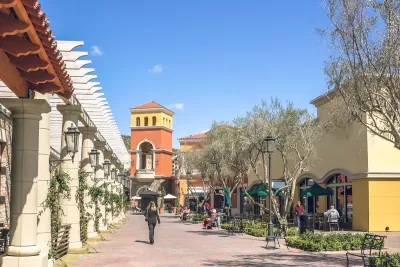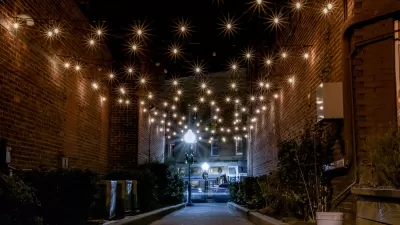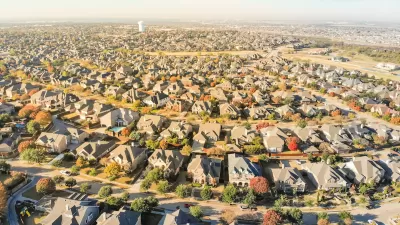Is the recent trend to build more walkable suburbs a sign of sustainable change?

Suburban developments are increasingly trying to mimic the walkability and vibrancy of urban neighborhoods, writes Alan Ehrenhalt in Governing. Is this a purely aesthetic shift, or is it a real movement toward more sustainable suburbs?
In Tempe, Arizona, 10 miles from Phoenix, a new community called Culdesac opted to remove private cars, offering access to transit, shared micromobility, and rental cars instead. According to Robert Steuteville, removing the need for car infrastructure inside the development “allows for a porous, fine-grain urban pattern with a network of narrow, shaded pedestrian-only paseos, intimate courtyards and a central plaza.” However, limited transit options mean that residents will often have to drive when leaving the community.
Ehrenhalt admits that the trend could be a blip. Lower housing costs — which could be brought on by the adaptive reuse of office buildings into residential units — could promote a stronger resurgence for urban city centers. But the strong demand for walkability among younger people is encouraging. “And if there is one thing we learned from the experience of the baby boomers, it is that when enough members of an emerging generation want something, they stand a very good chance of getting it.”
FULL STORY: A Possible Future for Downtowns Out in the Suburbs

Planetizen Federal Action Tracker
A weekly monitor of how Trump’s orders and actions are impacting planners and planning in America.

Chicago’s Ghost Rails
Just beneath the surface of the modern city lie the remnants of its expansive early 20th-century streetcar system.

San Antonio and Austin are Fusing Into one Massive Megaregion
The region spanning the two central Texas cities is growing fast, posing challenges for local infrastructure and water supplies.

Since Zion's Shuttles Went Electric “The Smog is Gone”
Visitors to Zion National Park can enjoy the canyon via the nation’s first fully electric park shuttle system.

Trump Distributing DOT Safety Funds at 1/10 Rate of Biden
Funds for Safe Streets and other transportation safety and equity programs are being held up by administrative reviews and conflicts with the Trump administration’s priorities.

German Cities Subsidize Taxis for Women Amid Wave of Violence
Free or low-cost taxi rides can help women navigate cities more safely, but critics say the programs don't address the root causes of violence against women.
Urban Design for Planners 1: Software Tools
This six-course series explores essential urban design concepts using open source software and equips planners with the tools they need to participate fully in the urban design process.
Planning for Universal Design
Learn the tools for implementing Universal Design in planning regulations.
planning NEXT
Appalachian Highlands Housing Partners
Mpact (founded as Rail~Volution)
City of Camden Redevelopment Agency
City of Astoria
City of Portland
City of Laramie





























